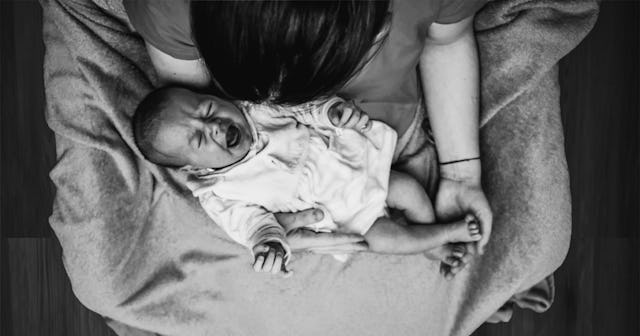The 1% We Never Wanted To Join

When my daughter was born, she couldn’t nurse or take a bottle. The hospital nurses sent us home with a starving child and a pat on my back: “She’ll nurse soon!”
My tiny girl spent her first few days of life screaming in frustration and hunger at my breast, tendons in her neck bulging likes ropes. Every one of her screams cut through me like a knife. I cried non-stop.
In desperation, my husband and I hired a lactation consultant. Our consultant, Nora*, appeared on our doorstep in scrubs and brimming with confidence. She assured us that breastfeeding was possible. Hers was the voice of authority and enthusiasm; the person who was going to light the path to a healthy breastfeeding relationship.
I told Nora that my rule-following, perfectionistic self was committed to breastfeeding and did not want to switch to formula unless I had to. “No formula,” she replied with a visible shudder.
“Hmm,” my sleep-deprived brain thought, attempted to access the server, then froze.
Nora laid out our plan. I was to pump around the clock to keep my supply up until my little girl was strong enough to nurse. In the meantime, my husband and I would feed our baby my expressed milk through a tiny catheter. Every three hours, 24 hours a day, we tried to nurse, fed with pumped milk, pumped, and then washed and sterilized all equipment. The routine took more than three hours, so by the time we had nearly finished one round, it was time to begin the next one. Not to mention that no one told my daughter to sync her diaper changes and other needs to our three-hour routine.
We never slept. We never slept.
The torturous sleep deprivation combined with raging and undiagnosed postpartum anxiety created a potent combination. My limbs were heavy and shaking all the time; I was constantly nauseated. I felt like my brain was on fire.
I didn’t know a way out of this hell other than through it, so through I went. Every week, Nora visited with a digital scale and tracked my daughter’s weight gain on her iPad. I also got to know Nora’s views as she spoke with me during appointments. She told me that infant formula is poison. When she learned I was a lawyer, she asked for legal advice on a class action lawsuit she planned to pursue against the federal government for including infant formula as a benefit in the Women, Infant, and Children (WIC) program.
“Hmm,” my brain thought again, buffered, and then crashed.
Six weeks in, when Nora adjusted her recommendation (breastfeed on demand, pump at a leisurely four-hour interval), she told us: “That was the hardest routine I’ve ever prescribed. I thought you would have given up by now. You all are in my top 1% of clients for sure.”
As these words washed over me, I crested a huge wave of pride, then tumbled into the trough. Wait. I didn’t know I was allowed to give up! At the time, I genuinely thought if I didn’t follow my lactation consultant’s advice, my baby would die.
rawpixel.com/Pexels
Remember the perfectionism, the sleep-deprivation, the postpartum anxiety, and the brain that was permanently off-line? Remember the professional who assured me my options were breast milk or poison? I thought my baby was poised on a precipice between starvation and death, and the only way to save her was for me to suffer through this torture ritual.
Years later, a psychiatrist who was a former lactation consultant told me carefully, “I’m proud of you for what you accomplished, but I would never suggest any parent go through what you did.” She told me that a new mom needs a minimum of six hours sleep per day and that supplementing with formula would have allowed me and my husband to split responsibility for night feedings and accept help from others.
I am forever grateful to Nora. We gave her a starving baby and she gave us a fed one. She saw my commitment to breastfeeding and she gave us the tools we needed to be successful.
I realize now, though, how vulnerable I was to catastrophic thinking, and how very badly I needed a voice of reason. I didn’t need someone filling the holes in my tattered brain with fear. I needed someone to take my hands and tell me: “Your baby doesn’t need a perfect mom, she just needs you.”
I only wonder if I would have been able to listen.
*Name has been changed.
This article was originally published on